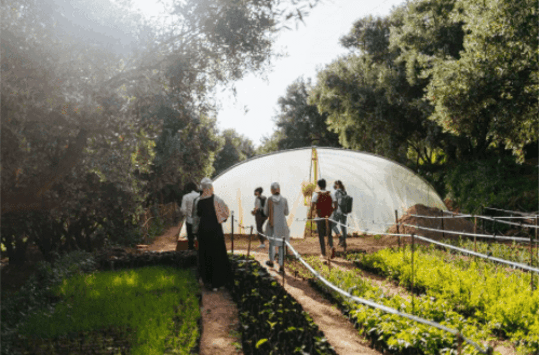How does HAF build a bridge of trust and strengthen the voices of the Moroccan community?

On May 18th, I traveled from Marrakech with the HAF President, Dr. Yossef Ben-Meir, Project Assistants Lahcen Ait Ouatouch and Mohamed Benyassine, and students from University of Pennsylvania’s International Impact Consulting traveled to meet the farmers – women and men – in the Ourika Valley’s Anamer Jamaan municipality, as well as in the Asni municipality, both in the Al Haouz province. Dr. Ben-Meir led a fruitful discussion between the women and students. Mainly, they tackled different points concerning challenges and potential solutions related to their cooperatives. The women are looking forward to making more progress in work and decreasing the pandemic’s effect on their work.
In Anamer Jamaane, the farmers received 16,000 pomegranate, fig, and olive trees. The trees were planted on farmers’ lands in five villages in that municipality. In addition, HAF provided 4,000 carob trees in partnership with the High Commission for Waters and Forests and a local association. The farmers are hoping to plant more trees on their land, a goal that can only be achieved by having more access to water. They would like to have solar energy which will help provide lower costs of water and electricity in five villages. The women were happy to exchange their thoughts about the cooperative with HAF’s team and students, including their idea to have someone sell their product on a nearby road to generate more revenue.
The field trip ended with a visit to HAF’s nursery in the Tadmamt village in Asni commune. The group met the nursery caretakers and talked about the nursery. The students were happy to hear how HAF and the local communities worked together to deal with challenges in their work. This kind of work is possible through a strong relationship with local communities based on trust.
This outing was a wonderful opportunity for students to learn more about Morocco from local communities, in particular questions about specific challenges facing farmers and the importance of tree nurseries to the communities who implement them. The farmers voiced their goals, their actions to achieve them, and ways they felt HAF’s facilitation could help further the projects’ success.
We are supporting their reaching out to partners for nurseries’ expansion and for water infrastructure efficiency, and we will assist in delivering new capacity-building workshops – through the USAID Farmer-to-Farmer Program. The Takhrkhourt Women’s Cooperative in Asni and HAF would like to sincerely thank the Rotary Clubs of Casablanca and Seattle, Washington for their contributions to sustainability.